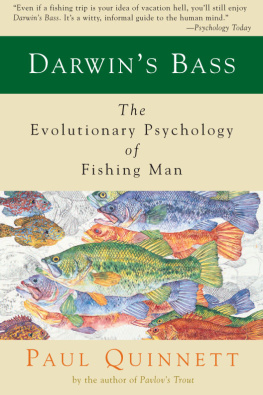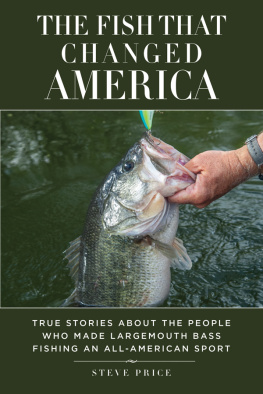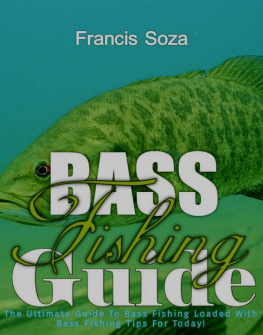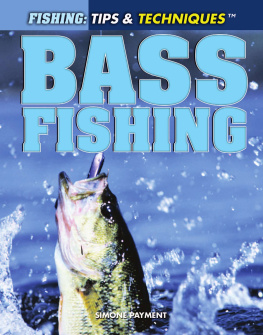Darwins Bass copyright 1996, 1998 by Paul Quinnett. All rights reserved. No part of this book may be used or reproduced in any manner without written permission except in the case of reprints in the context of reviews.
Andrews McMeel Publishing, LLC
an Andrews McMeel Universal company
1130 Walnut Street, Kansas City, Missouri 64106
www.andrewsmcmeel.com
Cover illustration copyright 1994, 1998 by Eileen Klatt. From her original watercolor Close Encounters.
Hardcover and paperback editions of this book were published in 1996 by Keokee Co. Publishing, Inc.
Library of Congress Cataloging-in-Publication Data
Quinett, Paul G., 1939
Darwins bass : the evolutionary psychology of fishing man / Paul Quinnett
p. cm.
Originally published: Sandpoint, Idaho : Keokee Co. Pub., c1996.
ISBN 0-8362-6838-5 (ppb)
1. Fishing. 2. FishingPsychological aspects. 3. Human evolution. I. Title.
[SH441.Q56 1998]
| 799.1'019dc21 | 98-17664
CIP |
ATTENTION: SCHOOLS AND BUSINESSES
Andrews McMeel books are available at quantity discounts with bulk purchase for educational, business, or sales promotional use. For information, please e-mail the Andrews McMeel Publishing Special Sales Department:
Also by Paul Quinnett
Pavlovs Trout
Fishing Lessons
Suicide: The Forever Decision

I had a strong taste for angling, and would sit for any number of hours on the bank of a river or pond watching the float.
Charles Darwin, 1809-82

Contents
Preface
T oday is the opening day of the general trout season where I live. It is a good day to begin the adventure of writing a new book. That I am writing this morning instead of trout fishing attests not to any sense of self-sacrifice to my readers, but to the wisdom one eventually acquires after witnessing enough opening days. Not to worry, Im going fishing this evening, well after the madness has waned and the wounded have been removed to the hospital.
Allow me to make a short cast.
The authors note is like a first cast to waters filled with hungry readers. The authors note is a lure. With a flashy note you hope to get a take so that you can, with a swift lift of the rod tip, drive the barb well and deep so as to hook the poor reader.
Then, if played well, the reader will be brought to net in the last chapter, spent but satisfied. Not to worry, this is a catch-and-release book.
My hope is to lure you, hook you and keep you for a time.
Now, lets see if I can tempt a strike.
Charles Darwin was a fisherman. Like most fishermen, he was a curious man, and it was his profound sense of curiosity, perhaps more than anything else, that enabled him to see things in ways others had never seen them. As he said of his own makeup, I am not apt to follow blindly the lead of other men.
The result? A long and productive life, many books and researches, and the publication of The Origin of Species in 1857. This book contained the single most dangerous idea presented to the world since Copernicus suggested the sun did not revolve around the Earth, but just the reverse was true. Where Copernicus moved man from the center of the universe to its outskirts, Charles Darwin moved him from the head of the class to a seat in the third row. In their time, each move was unsettling.
As an earthquake unsettles a familiar landscape, so the theory of evolution unsettled many of mankinds favorite myths. The tremors from that quake are still being felt. Like night crawlers spilled from a bait can tipped over from an aftershock, whole new sciences can be seen wriggling away from the evolutionary epicenter: genetics, molecular biology, ecology, ethology, neurobiology and sociobiology to name a few. Hardly exempt, the fields of sociology, psychology, psychiatry, ethics and even general medicine are being powerfully influenced by a better understanding of how and why we came to be what we are.
Almost daily these natural sciences speed to the same final frontier and intersection of understanding: the human brain. The most complex thing in the known universe, the human brain produces the least understood thing in that universe: the human mind.
We stand, just now, at the portals of the 21st century. We have solved many mysteries, but even greater mysteries lie ahead of us. And of these, our greatest challenge will be to understand how something we call a brain produces something we call a mind. The answer, if we find it, will change mankind like no other discovery in the history of the world. No Richter scale will be able to measure the shaking.
Only 150 years ago, Mr. Darwin wrote of natural law, Everything in nature is the result of fixed laws. No more. We are now in charge of natural law, or almost so. Our power is growing exponentially. Leapfrogging over the slow pace of natural selection, we already play god with the fishes. Tiger muskies and albino trout are childs play compared to the new transgenic fishes being spliced together in todays biology labs. From a fishs-eye view, man-the-gill netter, man-the-dam-builder, man-the-hatchery-operator, man-the-gene-splicer is already a god, complete with all the powers of life and death and even creation.
In Darwins time human behavior was not well-understood. Man and the mind of man was not even a fit subject for scientific inquiry. The behavior of fishermen was best explained by philosophers, men of God, bumps on the head or the shape of ones nose. It was widely believed in the 19th century that a mans character could be read by the shape of his head. Phrenology, or the slang bumpology, was the only available psychology, pop or otherwise.
Today we find such primitive thinking amusing. But consider that when he applied to sail as a naturalist on the Beagle, Darwin had to receive permission from the captain, who had to first undertake a careful study of the scientists nose. It was on this voyage that Darwins thinking about evolution matured.
Captain Fitzroy applied the latest scientific methods in examining young Darwins nose, found it satisfactory and thus determined their personalities were compatible and that a five-year voyage together would be possible. That such bad science could launch such a great scientist is a splendid irony.
This book is devoted not to Darwins nose, but to his curiosity as a young fisherman and the float he so intently watched.
It is under the fishermans float where the mysteries of the fishes and life and imagination swim.
It is under the fishermans float that we see the shadows of our ancient beginnings and the flashes of our possible futures.
It is under the fishermans float that we are drawn, not so much to see the fishes, but to learn what we do not know.
It is under the fishermans float that we may, one day, find that final understanding of the fishes and ourselves.
Darwin fished with worms. Later he flyfished with his college friends. A tender and thoughtful man, he studied earthworms intensively and wrote a definitive book about them. As a young fisherman, he was told by another angler that spitting on the worm might kill it. He later wrote,... and from that day I never spitted a living worm, though at the expense, probably, of some loss of success.
One of the greatest scientists in history, young Darwin began his magnificent search for truth with a fishing rod in one hand and a collecting net in the other. A modest man with a rare kind of self honesty and humility, Darwin wrote to a friend about how publishing The Origin of Species may have helped launch something new in this world, Well it is a beginning, and that is something...
Next page









